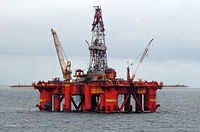
The United Nations Convention on the Law of the Sea (UNCLOS), also called the Law of the Sea Convention or the Law of the Sea Treaty, is an international agreement that establishes a legal framework for all marine and maritime activities. As of June 2016, 167 countries and the European Union are parties.
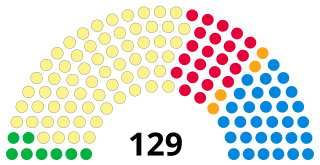
The Scottish Parliament is the devolved, unicameral legislature of Scotland. Located in the Holyrood area of the capital city, Edinburgh, it is frequently referred to by the metonym Holyrood. The Parliament is a democratically elected body comprising 129 members known as Members of the Scottish Parliament (MSPs), elected for five-year terms under the additional member system: 73 MSPs represent individual geographical constituencies elected by the plurality (first-past-the-post) system, while a further 56 are returned as list members from eight additional member regions. Each region elects seven party-list MSPs. Each region elects 15 to 17 MSPs in total. The most recent general election to the Parliament was held on 6 May 2021, with the Scottish National Party winning a plurality.
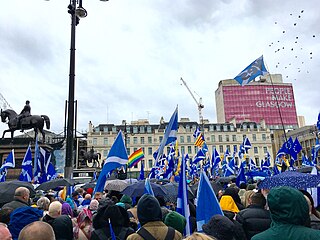
Scottish independence is the notion of Scotland as a sovereign state, independent from the United Kingdom, and refers to the political movement that is campaigning to bring it about.

The politics of Scotland operate within the constitution of the United Kingdom, of which Scotland is a country. Scotland is a democracy, being represented in both the Scottish Parliament and the Parliament of the United Kingdom since the Scotland Act 1998. Most executive power is exercised by the Scottish Government, led by the First Minister of Scotland, the head of government in a multi-party system. The judiciary of Scotland, dealing with Scots law, is independent of the legislature and the Scottish Government. Scots law is primarily determined by the Scottish Parliament. The Scottish Government shares some executive powers with the Government of the United Kingdom's Scotland Office, a British government department led by the Secretary of State for Scotland.
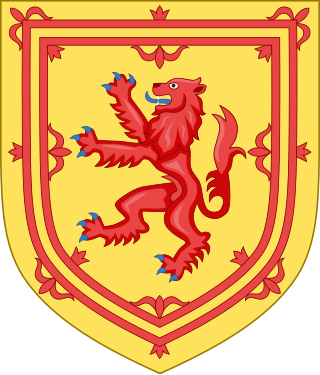
Local government in Scotland comprises thirty-two local authorities, commonly referred to as councils. Each council provides public services, including education, social care, waste management, libraries and planning. Councils receive the majority of their funding from the Scottish Government, but operate independently and are accountable to their local electorates. Councils raise additional income via the Council Tax, a locally variable domestic property tax, and Business rates, a non-domestic property tax.

Territorial waters are informally an area of water where a sovereign state has jurisdiction, including internal waters, the territorial sea, the contiguous zone, the exclusive economic zone, and potentially the extended continental shelf. In a narrower sense, the term is often used as a synonym for the territorial sea.

An exclusive economic zone (EEZ), as prescribed by the 1982 United Nations Convention on the Law of the Sea, is an area of the sea in which a sovereign state has exclusive rights regarding the exploration and use of marine resources, including energy production from water and wind. It stretches from the outer limit of the territorial sea out to 200 nautical miles (nmi) from the coast of the state in question. It is also referred to as a maritime continental margin and, in colloquial usage, may include the continental shelf. The term does not include either the territorial sea or the continental shelf beyond the 200 nautical mile limit. The difference between the territorial sea and the exclusive economic zone is that the first confers full sovereignty over the waters, whereas the second is merely a "sovereign right" which refers to the coastal state's rights below the surface of the sea. The surface waters are international waters.

Orkney and Shetland is a constituency of the House of Commons of the Parliament of the United Kingdom. It elects one Member of Parliament (MP) by the first past the post system of election. In the Scottish Parliament, Orkney and Shetland are separate constituencies. The constituency was historically known as Orkney and Zetland.

In the United Kingdom (UK), each of the electoral areas or divisions called constituencies elects one member to the House of Commons.

As a result of the Fifth Periodical Review of the Boundary Commission for Scotland, Scotland is covered by 59 constituencies of the House of Commons of the United Kingdom Parliament: 19 burgh constituencies and 40 county constituencies. These constituencies were used from the 2005 to the 2019 general elections, and will be replaced by new constituencies at the next election.
The Scottish Liberal Democrats is a liberal, federalist political party in Scotland, a part of the United Kingdom Liberal Democrats. The party currently holds 4 of the 129 seats in the Scottish Parliament and 4 of the 59 Scottish seats in the House of Commons.

The Scottish Adjacent Waters Boundaries Order 1999 is a statutory instrument of the United Kingdom government, defining the boundaries of internal waters, territorial sea, and British Fishing Limits adjacent to Scotland. It was introduced in accordance with the Scotland Act 1998, which established the devolved Scottish Parliament.

The Argentine Sea is a marginal sea of the Atlantic Ocean adjacent to the southern tip of South America. It ranges from the mouth of the estuary of the Río de la Plata in the north to the Isla de los Estados in the south, and from the Argentine coast to the 200 meters isobath. Its width varies between 210 km in front of Mar del Plata and 850 km at the latitude of the Falkland Islands. The coastline extends for 4,725 km. To the east of the Argentine Sea extends much deeper and more extensive Argentine Basin.
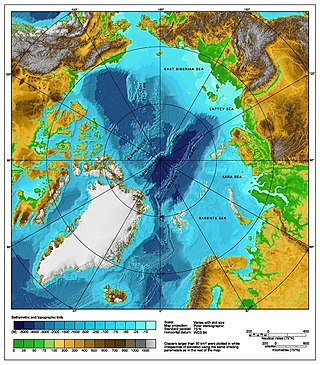
The Arctic consists of land, internal waters, territorial seas, exclusive economic zones (EEZs) and international waters above the Arctic Circle. All land, internal waters, territorial seas and EEZs in the Arctic are under the jurisdiction of one of the eight Arctic coastal states: Canada, Denmark, Finland, Iceland, Norway, Russia, Sweden and the United States. International law regulates this area as with other portions of Earth.
The McCrone report is a document on the Scottish economy written and researched in 1974 on behalf of the British Government. It was composed by Professor Gavin McCrone employed at the Scottish Office using some information that was publicly available at the time and some that was not. The document gave a favourable projection for the economy of an independent Scotland with a "chronic surplus to a quite embarrassing degree and its currency would become the hardest in Europe". It also noted that the Common Market or EEC meant that Scotland could pivot away from the rest of UK for trade. The memo from UK Civil Servants to UK Government ministers was classified “secret”;some have argued that this was to avoid fuelling independence sentiment in Scotland. The report became public in 2005 when new freedom of information legislation came into effect.

A general election was held in the United Kingdom on 5 May 2005 and all 59 seats in Scotland were contested. This was the first election to occur under the new boundaries which reduced the number of Scottish seats from 72 to 59. Previously, Scotland had a greater number of MPs per person than the rest of the UK to compensate for its distinct political nature and distance from Westminster. With the introduction of the Scottish Parliament, Scottish constituencies were brought into line with those found in the rest of the UK, so that they had similar electorates.

Elections for the Scottish district councils were held on Tuesday 7 May 1974, for both the new regional and district councils, between the two United Kingdom general elections of February and October in that same year.

A general election was held in the United Kingdom on Thursday 8 June 2017; all 59 seats in Scotland were contested under the first-past-the-post electoral system.
Marjorie Linklater was a Scottish campaigner for the arts and environment on the island of Orkney. She gave up acting at the Royal Academy of Dramatic Art to get involved in conservation, education, and health matters as a county councillor for Ross and Cromarty County Council. In 1975, Linklater was elected chairman of the Orkney Heritage Society, devoting herself to campaigning for the arts environment, local heritage, and politics. She successfully opposed the mining of uranium and the dumping of nuclear waste off Orkney's west coast and was a founding member of the St Magnus Festival. The Orkney Heritage Society named a senior school award in Linklater's honour following her death.
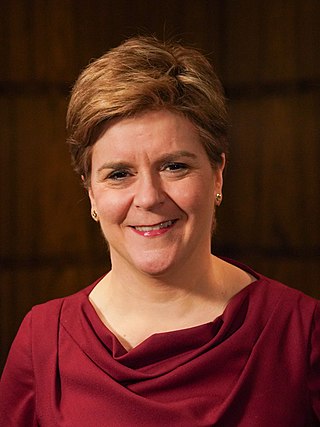
The 2022 Scottish local elections were held on 5 May 2022, as part of the 2022 United Kingdom local elections. All 1,227 seats across all 32 Scottish local authorities were up for election and voter turnout was 44.8%.
